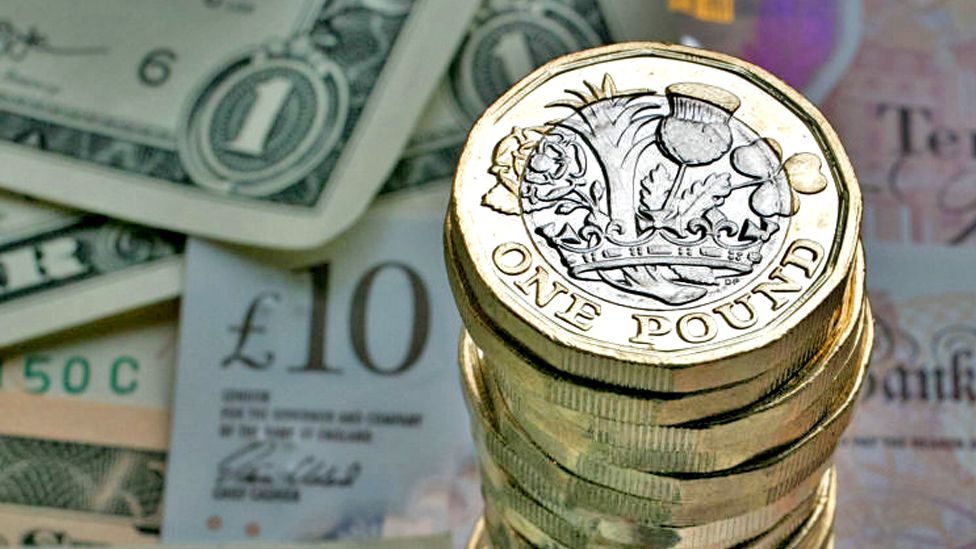Markets worry over the outlook for government finances following the biggest tax cutting moves in 50 years.
 Image source, Getty Images
Image source, Getty ImagesThe pound has fallen to a fresh 37-year low against the dollar as markets react to the chancellor’s mini-budget announcement.
UK stocks also slid after Kwasi Kwarteng outlined a series of tax cuts and economic measures in a massive shake-up of the country’s finances.
The pound dropped by nearly 2% against the dollar, putting it close to $1.10.
Sterling has been falling in recent weeks, partly down to the strength of the US dollar.
However, sterling also fell against the euro on Friday, with the pound down more than 1% at €1.12.
Meanwhile, the UK’s FTSE 100 of major shares fell to its lowest level for more than two months.
City analysts have been increasing their expectations of earlier and higher interest rates after the government announced a £45bn tax giveaway, leading some to conclude that inflation will remain high for some time.
According to Bloomberg data, analysts expect UK interest rates to hit 5.2% in August 2023, with expectations rising that there could be a one percentage point interest rate hike at the Bank of England’s next meeting in November.
On Thursday, the Bank increased UK rates by half a percentage point to 2.25%.
The cost of servicing the UK’s debt has also risen after the announcement of government borrowing to fund tax cuts.
‘Investors are worried’
Jane Foley, a currency strategist at Rabobank, said the market reaction shows investors are nervous about the economic outlook.
“There has been a very negative reaction in the markets in sterling,” she said, adding that some analysts “are talking about parity on the sterling/dollar exchange rate”.
Ms Foley said the sell-off showed investors have doubts about the government’s plans.
“They’re worried that some of these tax cuts that have been announced aren’t going to be fully funded. That will result in a large amount of debt at a time when the Bank of England is going to be selling some of its holdings of UK government debt,” she said.
“I think this government does need to provide a lot more reassurance that it does have fiscal sensibility in order. This is not the message that’s come across this morning.”


It is an unofficial Budget of staggering size designed to jump start the economy.
A £12bn corporation tax cut, a £17bn National Insurance cut, a £5bn basic rate income tax cut, and a £2bn cut to the 45p rate. Put together the biggest tax cutting moment for a half a century.
And while it should initially soothe some of the recession we are already likely in, the similarly huge borrowing has sent markets reeling.
It has been one of the worst days for UK Government bonds in decades, with some of biggest one-day hikes in the cost of borrowing since the 1990s.
This has consequences not just for government, but it sets the basis for long-term borrowing rates for companies and householders.
The lack of numbers, visibility, and quantifiable commitment to reining in government borrowing has added to uncertainty in markets.
The government had to tell the markets that it needed to borrow an extra £72bn this year, but did not publish the numbers behind that. Interest rates charged for British debt hit 4%, having been 3.1% earlier this week, and 1.8% at the beginning of the leadership contest with Rishi Sunak.
The Treasury’s answer to all this is a table of forecasts which shows how much tax revenue would be raised if its reforms were able to permanently raise growth in the economy.
But that table, while an aspiration that every chancellor and every politician seeks, has not convinced the markets. It is an assumption of extra tax revenue that has replaced actual tax.
The prime minister criticised bean counters in her leadership campaign. Today’s plan only shows one side of the ledger. For a chancellor making a debut, it is usual to focus on fiscal credibility. That was not the priority here.
There are considerable risks in this plan, but the government has thrown the kitchen sink at it. It should help growth upfront. But the echoes of the last Budget of this size in 1972, which led to the infamous Barber Boom and Bust, will not be comfortable.
